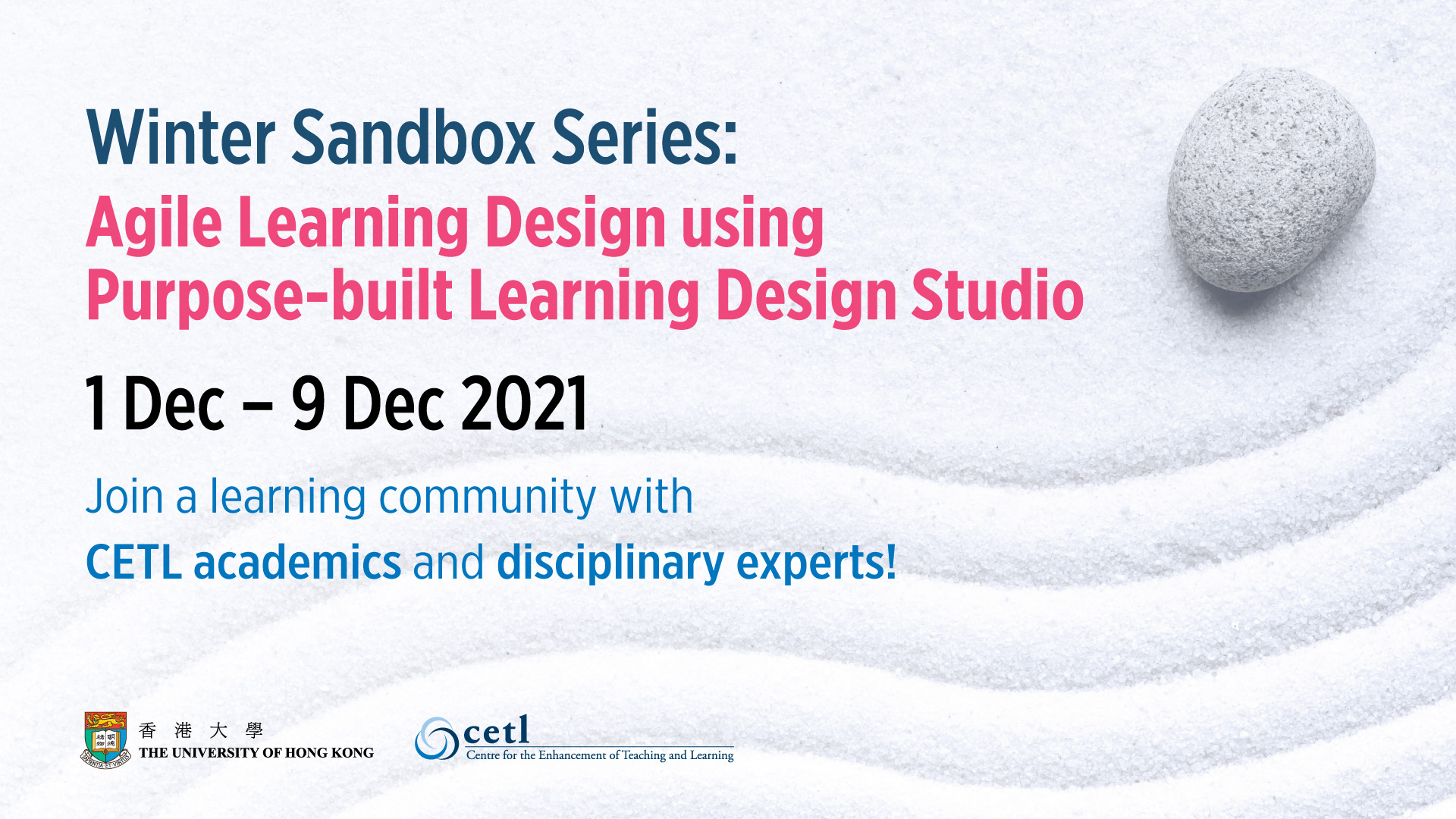
Organised by Centre for the Enhancement of Teaching and Learning (CETL)
Series Abstract
Learning design is a complex, creative, and iterative process involving pedagogical decision-making at multiple levels from course to topic session to learning tasks and resources. Teachers and instructional designers face the challenges of ensuring consistency and alignment across multiple levels and the capacity to cater for diverse student needs in achieving the intended learning outcomes. With the uncertainties posed by the COVID-19 pandemic, teachers face even greater challenges in having to flexibly implement learning designs in different or multiple modes, from face-to-face, blended synchronous, blended asynchronous, to hybrid and hyflex models of learning. Teachers need to be agile and flexible in reusing and repurposing design elements and ensure the pedagogical integrity of their course designs.
Built on the experiences of previous Sandboxes, this series introduces a purpose-built learning design tool, the Learning Design Studio (LDS, developed in CITE, HKU), to be used within the context of four themes in agile learning design: (1) Mission-focused inquiry approach for student success in different disciplines, (2) Case-based learning and designing for aligned assessment, (3) Student-staff partnerships and engagement, and (4) Learning spaces and learning environments. The workshops will highlight how LDS can facilitate the sharing and adaptation of design patterns for agile (re-)design, using the design patterns embedded in the four Sandboxes. Participants will have hands-on opportunities to explore how to make use of design patterns within the context of their own course (re-)designs.
All sessions will give participants a space for creative thinking, expert feedback, and support for iterative redesigns. We shall adopt the following format:
- Presentation: This part will involve a presentation on the Sandbox theme
- Hands-on Learning Design: The second part involves hands-on learning design using LDS, and is organized into cognate disciplinary groups to foster the building of a community of learning design professionals, comprising teachers, disciplinary experts, and instructional designers.
- Experience Sharing: At the end of each hands-on learning activity, participants will have the opportunity to share their work and thoughts regarding their course (re-)design.
We are excited to have you join us in this series! Let’s create more engaging learning experiences for our students with agility and expedience using a professional learning design tool!
This series will be delivered in a hybrid format, and participants can choose to join the session via Zoom or face-to-face. Each session will adopt a workshop format, and our recommendation is to join the face-to-face session for a better learning experience. Kindly check the details of each session for more information.
For face-to-face participants: To ensure that the seminar is held according to the guidelines on infection control measures for HKU events, limited seating of up to 45 people people will be implemented. Please note that registration will be on a first-come, first-served basis.
[1 Dec 2021] Session 1: Mission-focused inquiry approach for student success in different disciplines
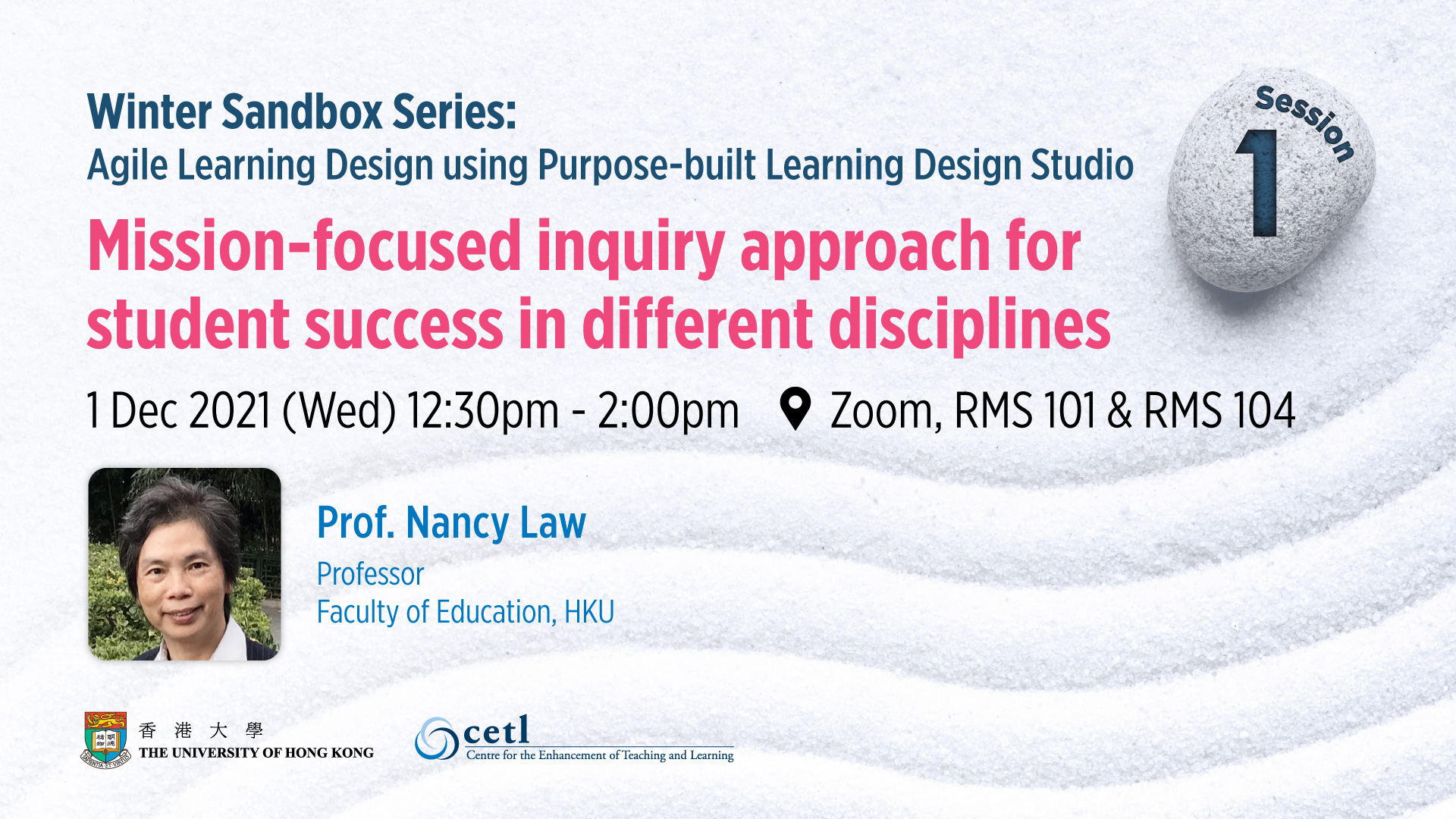
Date : 1 Dec 2021 (Wed)
Time : 12:30pm - 2:00pm
Hybrid Venue : Zoom and RMS 101 & RMS 104
Speaker : Prof. Nancy Law, Professor, Faculty of Education, HKU
(HKU Portal login required)
Abstract
Many teachers are adopting student-centred pedagogies that center around learning as productive, authentic inquiry. This Sandbox introduces one such approach in which an entire course is designed around a central mission for students to accomplish as a masterly deliverable. This approach can be adopted in many disciplines and the specification of the mission can be crafted to guide students through different course topics/components in a coherent way. This sandbox introduces the mission-focused inquiry approach using the purpose-built Learning Design Studio (LDS), which provides users with visualizations of the pedagogical aspects and considerations of the learning design at course, topic (or curriculum component), and learning task levels. LDS also provides a designer dashboard for the course designer to visualize the profile of student experiences as intended by the course design, allowing the designer to check the alignment of the course design against intended learning outcomes and across course components. A core feature of LDS is its use of design patterns as building blocks, with the modes of delivery as settings within the patterns. This provides agility for teachers to easily adapt their course design for diverse modes of delivery without losing the pedagogical integrity of their designs. An added advantage of using LDS is that the course design can be exported to Moodle for implementation.
In the hands-on part of the sandbox, participants will have the opportunity to explore two different courses adopting the mission-focused inquiry approach represented on LDS. They will examine how these two different courses were designed using the same set of design patterns, and how the use of these patterns can reduce the cognitive load of the learning designer. Participants will also explore how the mission-focused inquiry approach as well as the design patterns can be used in their own course designs.
About the Speaker
Prof. Nancy Law is a professor in the Faculty of Education at the University of Hong Kong. She served as the Founding Director for the Centre for Information Technology in Education (CITE) for 15 years from 1998. She also led the Science of Learning Strategic Research Theme at the University of Hong Kong. She is a Fellow of the International Society of the Learning Sciences, and is known globally for her strong record and expertise in the integration of digital technology in learning and teaching to promote student-centred pedagogical innovations. Professor Law received a Humanities and Social Sciences Prestigious Fellowship Scheme Award by the HKSAR Research Grants Council in 2014 in recognition of her research in scalability of technology-enhanced learning innovations. She is currently spearheading large projects in two related areas: implementation and refinement of multilevel network models of innovation as sociotechnical co-evolution, and investigation of students’ development as digital citizens from childhood to early adulthood. She has served on a number of policy advisory boards/working groups related to ICT in education for the University of Hong Kong, the Hong Kong SAR government and other community, government groups and institutions. She has also been contributing as expert consultant to the European Commission, UNESCO and OECD on various aspects of technology-enhanced learning.
[3 Dec 2021] Session 2: Aligning assessment in a case-based course
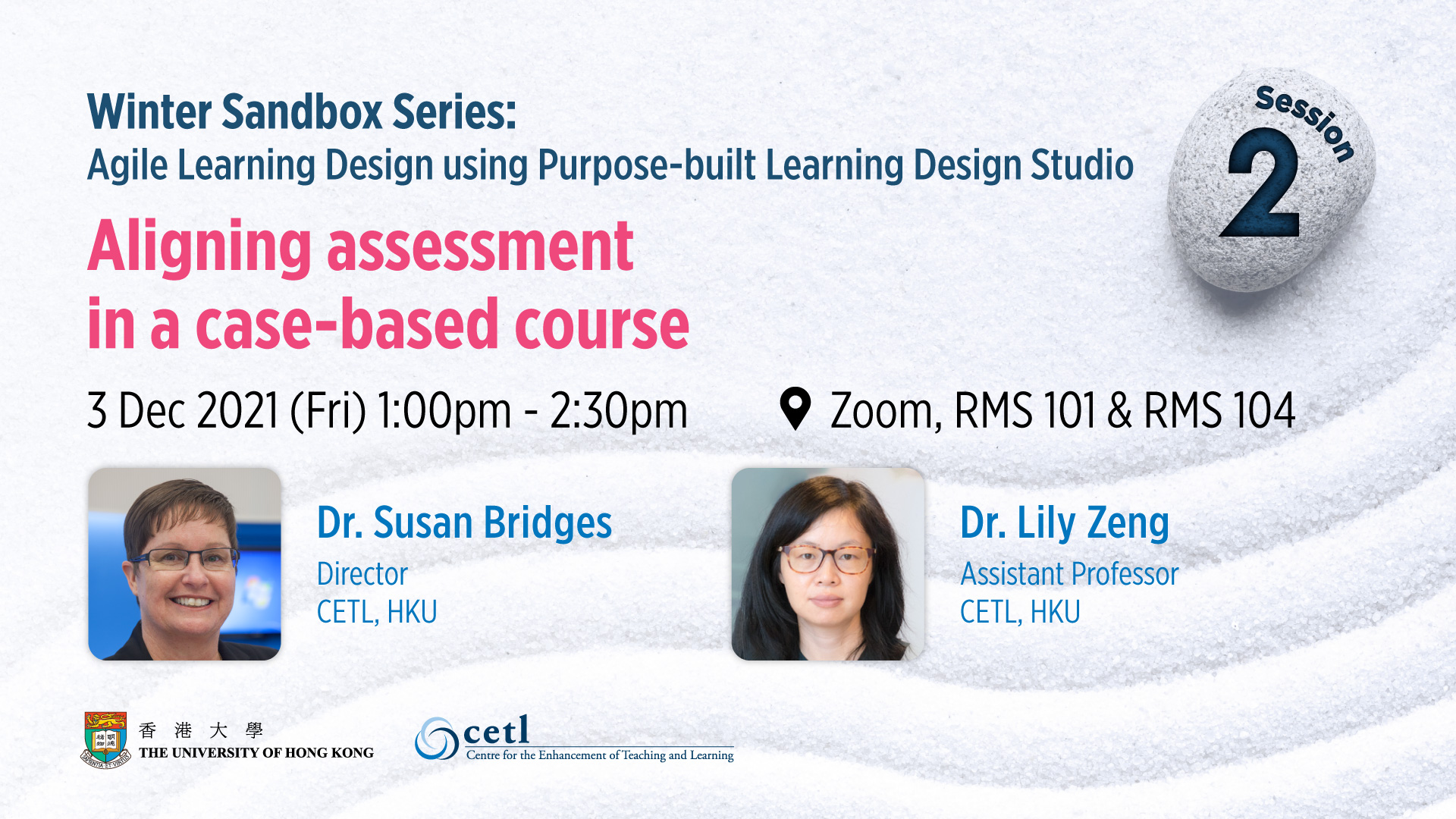
Date : 3 Dec 2021 (Fri)
Time : 1:00pm - 2:30pm
Hybrid Venue : Zoom and RMS 101 & RMS 104
Speaker : Dr. Susan Bridges, Director, CETL, HKU; Dr. Lily Zeng, Assistant Professor, CETL, HKU
(HKU Portal login required)
Abstract
How can we better achieve OBASL’s core principle, constructive alignment, in a course design? This session focuses on backward mapping to unpack how one course teacher has sought to align a range of continuous assessments in one 2020-21 case-based course. We will demonstrate how the visualization function in the Learning Design Studio (LDS) can be used as a diagnostic tool to support reflective examination, the design of authentic assessments and their alignment with Course Learning Outcomes (CLOs). Participants will be given time for hands-on design work using LDS for constructive alignment and the opportunity to share ideas on designing continuous, authentic assessments.
About the Speakers
Dr. Susan Bridges is the Director the Centre for the Enhancement of Teaching and Learning (CETL) and former Assistant Dean (Learning and Teaching/ Curriculum Innovation) in the Faculties of Education and Dentistry at The University of Hong Kong (HKU). Her higher education initiatives focus on curriculum and faculty development projects in professional education most recently chairing the reform of the HKU Postgraduate Diploma in Education (Bridges et al, 2018). She is particularly interested in integrated curriculum designs and inquiry-based learning and how educational technologies can support and enhance these (see QS Wharton Awards). In 2016, she was invited to join the Universitas21 (U21) Steering Group for the Educational Innovation Cluster to support network-wide initiatives (Bridges, Armour et al, 2019). Her HKSAR RGC and internationally-funded research demonstrates a core interest in human interactions exploring the ‘how’ of effective pedagogies and designs through ethnographic approaches. She serves on the Editorial Board for the Interdisciplinary Journal of Problem-based Learning. Since 2017, she has served as a finalist judge for the QS Wharton Reimagine Education Awards. In 2020, she was elected as Chair of the Problem-based Education SIG of the American Educational Research Association (AERA) and will publish her next co-edited volume (with Rintaro Imafuku) on “Interactional Research into Problem-based Learning” with Purdue University Press.
Dr. Lily Zeng is currently the Programme Leader of Professional Certificate in Teaching and Learning in Higher Education and is responsible for the Senior Fellow Scheme of the HKU Advance HE Fellowship Scheme at HKU. In addition to these roles, she also provides pedagogical consultations for colleagues in various areas and teaches in the Certificate of Teaching and Learning in Higher Education. She has worked in higher education for more than 20 years and worked on various fields of teaching and learning during her 12-year experience in the central teaching and learning units. She is now particularly focusing on adaptive learning, student engagement, assessment, and conceptual change. She had published in high-impact journals and been invited to give talks on learning and teaching to universities in Hong Kong, New Zealand, Australia, Macau, and Mainland China.
[7 Dec 2021] Session 3: Promoting student-staff partnerships and engagement using learning design
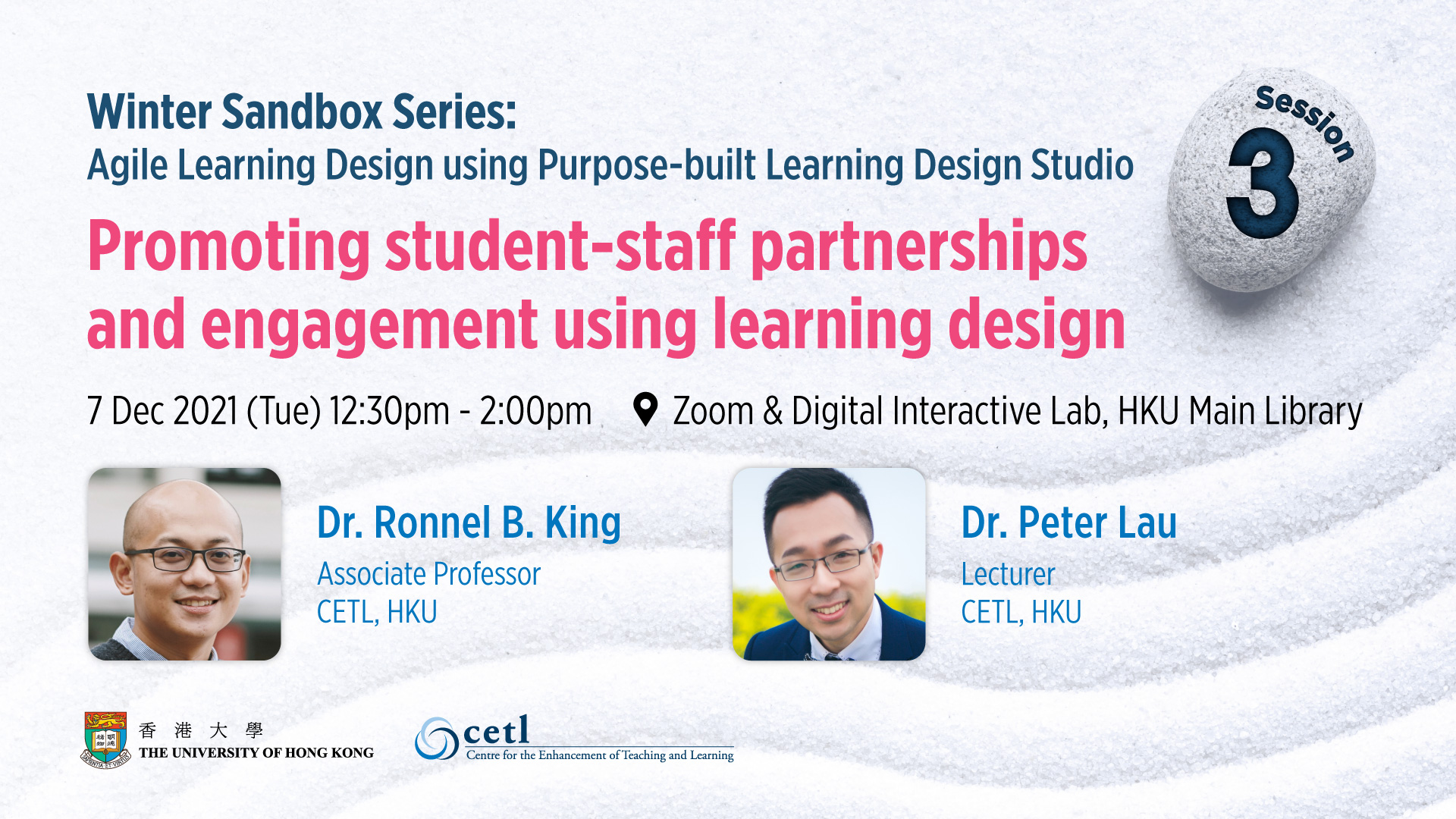
Date : 7 Dec 2021 (Tue)
Time : 12:30pm - 2:00pm
Hybrid Venue : Zoom and Digital Interactive Lab, HKU Main Library
Speaker : Dr. Ronnel B. King, Associate Professor, CETL, HKU; Dr. Peter Lau, Lecturer, CETL, HKU
(HKU Portal login required)
Abstract
The goal of this talk is to showcase how the learning design framework, and Learning Design Studio (LDS) in particular, can be used to enhance student-staff partnerships and student engagement. Student-staff partnerships focus on how students and faculty/staff can become collaborating partners toward curriculum development in higher education. Engagement focuses on how students can become behaviorally, emotionally, and cognitively involved in the teaching-learning process. However, much of the existing research on student-staff partnerships focus on the readiness of faculty members and less about how students can contribute their expertise to the course design. Moreover, prior work on student engagement has not been explicitly linked to learning design nor the affordances of key technologies. In this session, we highlight how the learning design framework as well as the specific features of LDS can help promote student-staff partnerships and optimal engagement.
About the Speakers
Dr. Ronnel King is an Associate Professor at the Centre for the Enhancement of Teaching and Learning, Faculty of Education, The University of Hong Kong. He also holds honorary appointments at The University of Macau and The Education University of Hong Kong. He is recognized as among the top 2% of the most highly-cited education scholars in the world. His research focuses on understanding the factors that underpin student motivation and well-being and designing positive psychology & education interventions to promote these optimal states. He is currently guest editing special issues on teaching and learning during the COVID-19 pandemic in Educational Psychology and Educational and Developmental Psychologist.
Dr. Peter LAU is a Lecturer in the Centre for the Enhancement of Teaching and Learning at HKU. He provides training on teaching skills for Graduate Teaching Assistants in the Certificate in Teaching and Learning in Higher Education course. To facilitate continuous professional development for young/new colleagues, Peter supports colleagues working towards Associate Fellow and Fellow of Advance Higher Education by mentoring and reviewing applications. Before joining HKU in 2017, Peter worked closely with undergraduate and postgraduate students when he coordinated co-curricular programmes (including student ambassador schemes, service-learning tours, creative drama festival, residential education events, Arts and Cultural Education activities, etc.) in the Centre for Holistic Teaching and Learning at HKBU.
[9 Dec 2021] Session 4: Finding the learning environment in your learning design
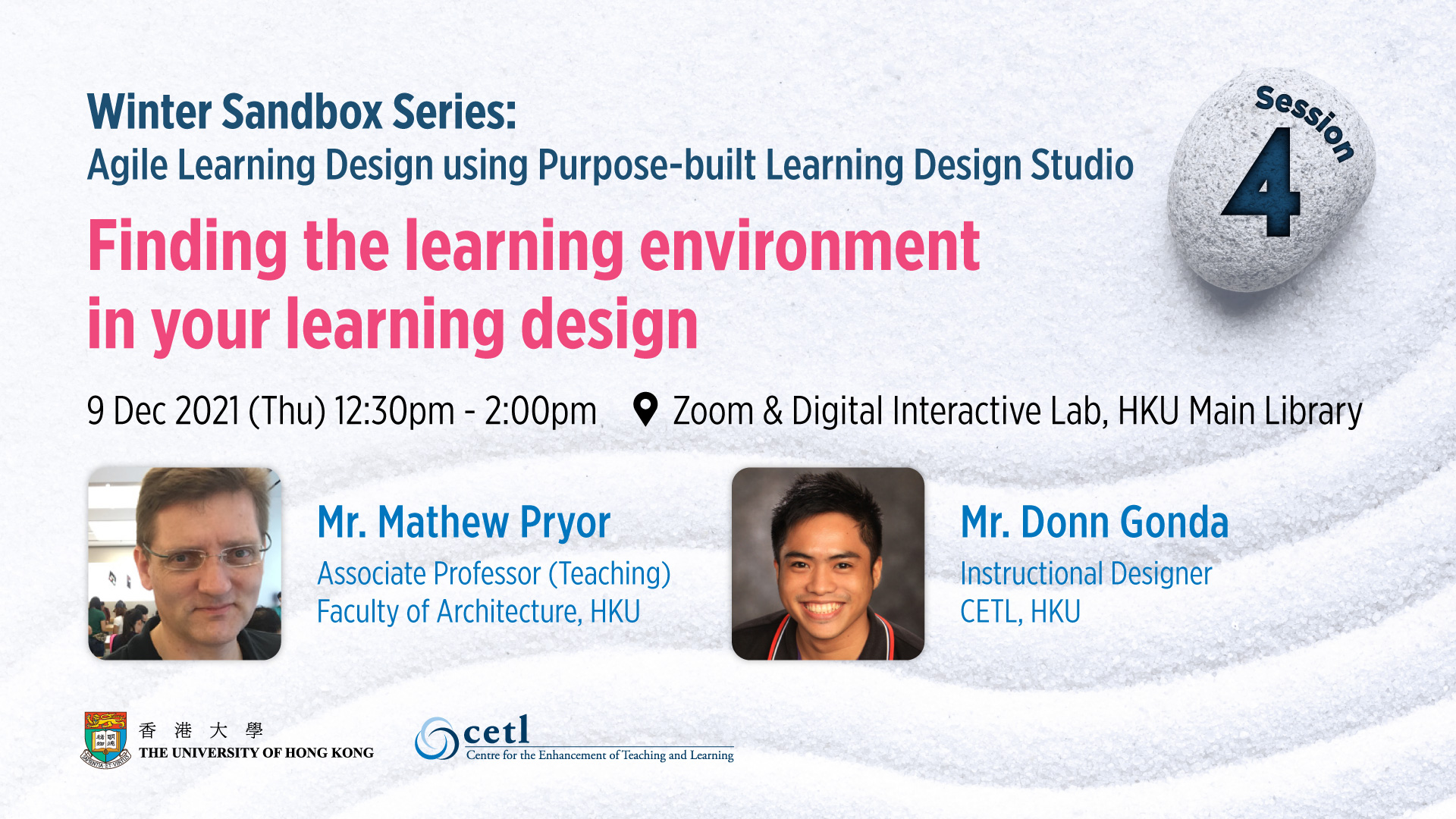
Date : 9 Dec 2021 (Thu)
Time : 12:30pm - 2:00pm
Hybrid Venue : Zoom and Digital Interactive Lab, HKU Main Library
Speaker : Mr. Mathew Pryor, Associate Professor (Teaching) in Faculty of Architecture, HKU; Mr. Donn Gonda, Instructional Designer, CETL, HKU
(HKU Portal login required)
Abstract
The learning environment has been under the spotlight as uncertainties posed by the COVID-19 pandemic change how we deliver our courses. Teachers having gone from F2F to virtual, and now back to F2F again (…mostly), often find themselves needing to constantly fine-tune their course design. The next challenge for teachers is to blend the best of their online classes (and the various EdTech skills we acquired along the way) back into a new F2F format. In this session, we will demonstrate how the learning design studio can facilitate the reusing and repurposing of design elements, particularly the learning environment, and ensure the pedagogical integrity of their course designs.
About the Speakers
Mr. Mathew Pryor is an Associate Professor (Teaching) in the Faculty of Architecture, and a Senior Fellow of the Higher Education Academy (UK). He combines more than 20 years of experience as a practicing landscape architect with teaching and research in the Division of Landscape Architecture at HKU. Through his courses in design, sustainable development, and construction technologies, he has developed a pedagogical approach based around the socialization of online learning and transdisciplinary teaching. He was a recipient of a HKU Teaching Innovation (Team) Award (2020) and UGC Teaching (Team) Award (2019). He has recently completed TDG Studies on ‘Understanding the Role of Positive Emotion in Student Engagement’ and ‘Addressing student stress in design studio’.
Mr. Donn Gonda is an instructional designer at the Center for the Enhancement of Teaching and Learning and a lecturer at the Faculty of Education at the University of Hong Kong. His areas of expertise are developing and evaluating higher education courses, teaching and training instructional design skills, and leveraging analytics and research to innovate teaching and learning. He has led several e-learning projects, including MOOC, SPOC, blended learning, and flipped classroom.
For information, please contact:
Ms. Lavina Luk, CETL
Phone: 3917 5272; Email: ytluk89@hku.hk


















